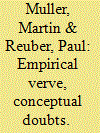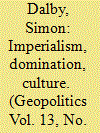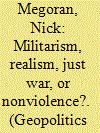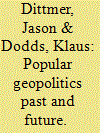|
|
|
Sort Order |
|
|
|
Items / Page
|
|
|
|
|
|
|
| Srl | Item |
| 1 |
ID:
084640


|
|
|
|
|
| Publication |
2008.
|
| Summary/Abstract |
In this paper, I outline three main issues that divide classical and critical geopolitics and offer a critique of the latter. The three issues are (1) criticism, (2) the relative importance of discourses vs. materiality/political economy, and (3) the status of knowledge claims (universal or partial). Through this discussion I present my own view, whose central claim is that versions of critical geopolitics relying to a great extent on discursive analysis should pay more attention to political economic factors. True, most studies in critical geopolitics pay attention to the institutional affiliation of political elites, but very few discuss the workings of the political economic system within which policy is formulated. To illustrate my points empirically, I discuss the bomber gap of the 1950s; the gap refers to the alleged fall of the United States behind the Soviet Union in strategic bombers under Eisenhower, a scare that gave rise to influential discourses describing American military inferiority.
|
|
|
|
|
|
|
|
|
|
|
|
|
|
|
|
| 2 |
ID:
084635


|
|
|
|
|
| Publication |
2008.
|
| Summary/Abstract |
When critical geopolitics entered German political geography, its empirical verve helped crank up a discipline which had diminished into an academic backwater. Soon, however, conceptual doubts began to supersede the initial enthusiasm with which critical geopolitics had been welcomed into political geography. Critical voices in German geography highlight the conceptual heterogeneity of critical geopolitics which engenders clashes between different, partly incommensurable epistemologies. Our paper traces the empirical and conceptual trajectory of critical geopolitics and the multifarious critique of it in German geography, before venturing to take a fresh look at poststructuralist, postcolonialist and systems theoretical approaches which, in the German context, are discussed as conceptual avenues that might usefully inform the further development of critical geopolitics.
|
|
|
|
|
|
|
|
|
|
|
|
|
|
|
|
| 3 |
ID:
084642


|
|
|
|
|
| Publication |
2008.
|
| Summary/Abstract |
Europeanisation is a legitimising process through which the European Union strives to gain meaning, actorness and presence internationally. However, this process continues to be described in less than complimentary ways as ambiguous, incomplete, unsettled, or impotent. We contend that it is the contradictory demands of negotiating order at the 'internal' and 'external' levels both operationally and normatively which critically affect the EU's ability to achieve presence and actorness in international affairs. In this paper we focus upon the role of the European Commission in the external projection of Europeanisation towards the Mediterranean with an emphasis upon the discursive construction, performance and survival of Europeanisation. We show the ways in which the external projection of Europeanisation produces fuzziness and messiness in which the Mediterranean emerges as both a chaotic conception and site of chaos.
|
|
|
|
|
|
|
|
|
|
|
|
|
|
|
|
| 4 |
ID:
084641


|
|
|
|
|
| Publication |
2008.
|
| Summary/Abstract |
There has been much controversy over the role that ethnic diasporas (sometimes called "lobbies") do or should play in shaping American foreign policy. This article looks at one particular ethnic group, American Jews, with a view to assessing the claim made by some authors, to the effect that "neoconservatism" has been influenced considerably by Judaism. The article mostly debunks that claim, at least if the suggestion is that something about Judaism as a religion can help account for the policy agendas espoused by neoconservatives in recent years. However, the authors do argue that a "geo-ethnic" link can be established between a Jewish diaspora in America and the evolution of neoconservatism. Their claim is that a "borderlands" tradition emanating originally on the Russian frontier in the latter part of the nineteenth century was exported to America, through the migration of peoples they refer to as "new borderers." This folk community, the authors argue, coalesced with another, well-established, folk community of "borderers" (the Scotch-Irish), resulting in the formation of the coalition known in recent years as neoconservatism - a coalition representing a fusion of Jacksonianism and Wilsonianism.
|
|
|
|
|
|
|
|
|
|
|
|
|
|
|
|
| 5 |
ID:
084633


|
|
|
|
|
| Publication |
2008.
|
| Summary/Abstract |
Twenty years ago Gear id Tuathail called for an approach within Political Geography that made geopolitical culture and the formulation of foreign policy the object of analysis. He specified the task of what subsequently became critical geopolitics as the need to expose the complicity of geopolitics with domination and imperialism. After the cold war there was a decade when military matters declined in importance and globalisation confused the geographical designations of danger. In the aftermath of 9/11 the utility of force has been reasserted by a neo-Reaganite American foreign policy using military force in the global war on terror and the invasion of Iraq. Now the geopolitical culture is a matter of debates about empire and the appropriate geopolitical designation of danger, whether in Thomas Barnett's non integrated gap on "the Pentagon's New Map" or in the complex geographies of Alain Joxe's "Empire of Disorder". This re-militarisation of global politics clearly suggests the continued relevance of Tuathail's specification of the need for critical geopolitics to grapple with the culture that produces imperial attempts at domination in distant places.
|
|
|
|
|
|
|
|
|
|
|
|
|
|
|
|
| 6 |
ID:
084638


|
|
|
|
|
| Publication |
2008.
|
| Summary/Abstract |
Despite illuminating multiple modalities by which armed conflict is discursively justified, critical geopolitics can be criticised for providing a weak normative engagement with the social institution and practices of warfare. This has limited the impact of this school of thought outside of geography and critical security studies at a time when the ethics of military intervention have been prominent in public debate. This article explores the moral discourse of critical geopolitics through an examination of Gerard Toal's writings on Iraq and Bosnia. This scholarship is reviewed in the light of Coates's typology of major traditions of moral reflection on war - militarism, realism, just war theory, and pacifism/nonviolence. This analysis interrogates Toal's narratives, in which American military intervention was advocated in the Former Yugoslavia and opposed in Iraq. This suggests that rather than a thoroughgoing commitment to pacifism/nonviolence, or a blanket cynicism about American foreign policy, Toal's thinking includes an underlying attachment to some form of just war reasoning. However, its implicit and partial appropriation leads to a certain incoherence and selectivity that calls for further reflection. This presents a challenge to critical geopolitics. If it chooses to engage more explicitly with just war theory, its insights into identity and militarism could in turn inform a reworking of aspects of the theory, thereby facilitating critical geopolitics' engagement with wider public anti-militaristic modes of discourse. However, as this risks blunting the political potential of the project and repeating the mistakes of twentieth-century geopolitical thought, the paper concludes with a call for a wholehearted commitment to nonviolence.
|
|
|
|
|
|
|
|
|
|
|
|
|
|
|
|
| 7 |
ID:
084634


|
|
|
| 8 |
ID:
084678


|
|
|
|
|
| Publication |
2008.
|
| Summary/Abstract |
Since the outbreak of the conflict in the second half of the 1980s, Nagorno-Karabakh has been represented from two perspectives of ethnic incompatibility, which justifies ethnic cleansing by matching the state borders with ethnic ones, and the Great Game narrative, which examines the conflict as part of the global power struggle in the Eurasian continent by disregarding societies and undemocratic regimes in the region. However, time has revealed that these perspectives neither appreciate the internal conditions of the conflict nor offer a way out of the current impasse. By criticising the 'commonsense' and 'realness' of these representations, this study argues that analysing who gains from the current status quo will offer solutions for a sustainable peace in the region. As long as undemocratic regimes of Azerbaijan and Armenia are satisfied with the status quo and outside powers maximise their interests, the 'no war no peace' situation will not be challenged. A way out is only possible by including the people, who are actually on the losing side, in the decision-making and peace-making process.
|
|
|
|
|
|
|
|
|
|
|
|
|
|
|
|
|
|
|
|
|